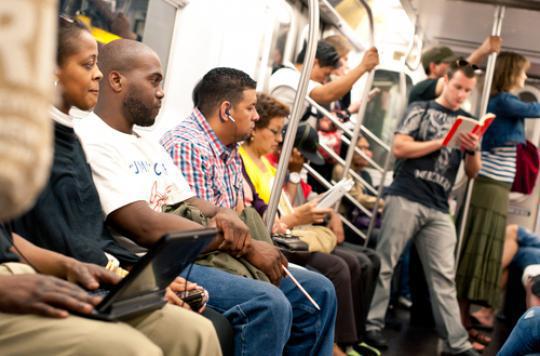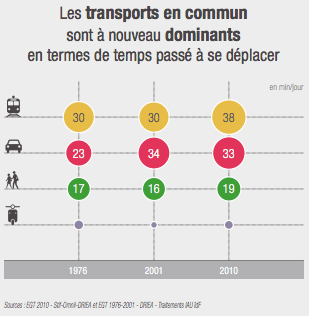Whether by metro or bus, Ile-de-France residents have never spent so much time in public transport. Good for the line, this mode of travel has a dark side.

In 2010, Ile-de-France residents spent 92 minutes per day on their trips (car, public transport, on foot, etc.), which is 9 minutes more than in 2001, according to the latest study of the Institute of Planning and Urbanism of Île-de-France (IAU). And if work remains the most time-consuming reason for travel, it is private activities, especially leisure, which explain this increase.
The inhabitants of Île-de-France mostly travel by public transport. They spend, on average, 38 minutes a day. This is 8 minutes more than in 2001 (+ 20%) spent in the bus, metro or bus.

Jérémy Courel, an econometrician in charge of the study, concludes that “public transport thus ranks first ahead of the car in terms of time spent traveling, with 41% of the total time budget, against 36% by car” for Parisians. A way of life which obviously has more or less good consequences on the health of the inhabitants of the capital.
The good (metro) lines for the line
These can indeed be beneficial. An English study published in the journal The Lancet recently showed that people who walk or cycle to work have, on average, a lower Body Mass Index (BMI) than those who take their car. Better still, public transport users would be less fat. Results to remember when the metro is crowded, for example …
And to forget the smells and noises of the corridors of the RATP (1), other data confirms the benefits of public transport. This is the case of a study carried out in Osaka (Japan) which showed, at the end of December 2015, that people using public transport are in better health than those who go to work by bicycle or by walking.
The latter indeed reduce their risk of suffering from overweight, hypertension, or diabetes by 44%, 27% and 34% respectively, compared to others. The authors explain this by the fact that these people walk more.
Conjugal instability, burn-out …
However, it should be noted that the world of public transport is not a magic recipe for good form. Certain employees can, it is true, leave their health there. The “large mobiles”, which transit 2 hours per day in a train or a bus to get to their work, would be more affected by stress, fatigue, but also burn-out.
In addition, among women, long journeys are responsible for more “marital instability” and “lower fertility”, according to a survey conducted in Europe.
Finally, surveys carried out in several cities in France show that exposure to fine particles is significant in the subways. “A risky situation for those who work there”, recalled last year theANSES (National Agency for Food, Environmental and Occupational Health Safety) in a report.
(1) Autonomous Parisian transport authority
.

















